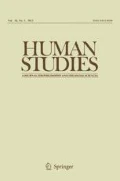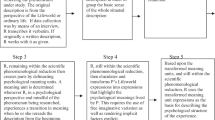Abstract
Multiple disciplines have contributed to acculturation research with aims to measure, conceptualize, and theorize this complex phenomenon. Few studies, however, have attempted to find meaning in how acculturation is lived and, this lack may have contributed to acculturation being understood as a construct removed from human experience. The purpose of this article is to show how a research methodology based on phenomenological epistemology can humanize the understanding of the acculturation experience. This contribution is demonstrated in a study that used a phenomenological approach to describe and elucidate acculturation as a lived experience in the context of Latina adolescents who emigrated from Mexico to the US. Thus, this article illustrates how the phenomenological approach used in this study allows new meanings of acculturation to be experientially revealed.
Similar content being viewed by others
Notes
The term Latina refers exclusively to females who are from a Latin American country or identify with Latin American ancestry. I use it to designate the participants in this study. This referent is a shortened version of the longer descriptor—Mexican immigrant female adolescents. For the purpose of this study, the participants unanimously agreed that the term Latina was appropriate.
The society of origin refers to the country or region an immigrant moves from.
The society of settlement refers to the country or region an immigrant moves to and settles in.
I selected the word girl as a referent for the participants in this study. For the purpose of this study, the participants unanimously agreed that the term girl was appropriate.
The lifeworld is a central concept in phenomenology. It refers to the everyday absorption in one’s life, in which individuals do not consider their biases, presumptions, or prejudices; it is a pre-reflective state of being.
Alfred Schutz wrote the essay “The Stranger: An Essay in Social Psychology” soon after he immigrated to the US as an adult. In the essay, “the stranger” is viewed as an interpreter of cultural patterns.
Living relationally refers to experiencing the world through interpersonal relationships as well as through the relationship one has with culture.
References
Berry, J. W. (1997). Immigration, acculturation, and adaptation. Applied Psychology: An International Review, 46(1), 5–68.
Cuéllar, I., Arnold, B., & Maldonado, R. (1995). Acculturation rating scale for Mexican Americas-II: A revision of the original ARSMA Scale. Hispanic Journal of Behavioral Sciences, 17(3), 275–304.
Dahlberg, K., & Drew, N. (1997). The lifeworld paradigm for nursing research. Journal of Holistic Nursing, 15(3), 303–317.
Dahlberg, K., Drew, N., & Nyström, M. (2001). Reflective lifeworld research. Lund: Studentlitteratur.
Giorgi, A. (1997). The theory, practice, and evaluation of the phenomenological method as a qualitative research procedure. Journal of Phenomenological Psychology, 28(2), 235–260.
Heidegger, M. (1927/1962). Being and time (trans: J. Macquarrie & E. Robinson). New York: Harper and Row.
Hernandez, M. (1996). Central American families. In M. McGoldrick, J. Giordano, & J. K. Pearce (Eds.), Ethnicity and family therapy (2nd ed., pp. 214–224). New York: Guilford Press.
Husserl, E. (1936/1970). The crisis of European sciences and transcendental phenomenology (trans: D. Carr). Evanston: North Western University Press.
LaFromboise, T., Coleman, H. L. K., & Gerton, J. (1993). Psychological impact of biculturalism: Evidence and theory. Psychological Bulletin, 114(3), 395–412.
Marcel, G. (1960). The mystery of being (Vol. 1) (trans: G. S. Fraser). London: The Harvill Press, Ltd.
Mendoza, R. H. (1984). Acculturation and sociocultural variability. In J. L. Martinez Jr. & R. H. Mendoza (Eds.), Chicano psychology (2nd ed.). Orlando: Academic Press.
Merleau-Ponty, M. (1945/1962). The phenomenology of perception (trans: C. Smith). London: Routledge and Kegan Paul.
Northover, M. (1988). Bilingual or “dual linguistic identities”?. In J. Berry & R. Annis (Eds.), Ethnic psychology: Research and practice with immigrants, refugees, native peoples, ethnic groups and sojourners (pp. 207–216). Berwyn: Swets North America.
Oetting, E. R., Swaim, R. C., & Chiarella, M. C. (1998). Factor structure and invariance of the orthogonal cultural identification scale among American Indian and Mexican American youth. Hispanic Journal of Behavioral Sciences, 20(2), 131–154.
Olmedo, E. L., Martinez, J. L., & Martinez, S. R. (1978). Measure of acculturation for Chicano adolescents. Psychological Reports, 42, 159–170.
Padilla, A. M., Cervantes, R. C., Maldonado, M., & Garcia, R. E. (1988). Coping responses to psychological stressors among Mexican and Central America immigrants. Journal of Community Psychology, 16, 418–427.
Ramirez, M. (1991). Psychotherapy and counseling with minorities: A cognitive approach to individual and cultural differences. Elmsford: Pergamon.
Redfield, R., Linton, R., & Herskovits, M. (1936). Memorandum for the study of acculturation. American Anthropologist, 38, 149–152.
Rotheram-Borus, M. J. (1990). Adolescents’ reference-group choices, self-esteem, and adjustment. Journal of Personality and Social Psychology, 59, 1075–1081.
Sabogal, F., Marín, G., Otero-Sabogal, R., Marín, B. V., & Perez-Stable, E. J. (1987). Hispanic familism and acculturation: What changes and what doesn’t? Hispanic Journal of Behavioral Sciences, 9(4), 397–412.
Schutz, A. (1944). The stranger: An essay in social psychology. American Journal of Sociology, 49(6), 499–507.
Schutz, A. (1964). Collected papers volume II: Studies in social theory. The Hague: Martinus Nijhoff.
Skuza, J. A. (2003). The experience of acculturation for Latina adolescents from Mexico: A phenomenological study. Unpublished doctoral dissertation, University of Minnesota.
Szapocznik, J., Scopetta, M., Kurtines, W., & Aranalde, B. (1978) Theory and measurement of acculturation. Interamerican Journal of Psychology, 12, 113–130.
van Manen, M. (1990). Researching lived experience. Albany: State University of New York Press.
Von Knorring-Giorgi, B. (1998). A phenomenological analysis of the experience of pivotal moments in therapy as defined by clients. Unpublished doctoral dissertation, University of Quebec, Montreal.
Vigil, J. D. (1998). From Indians to Chicanos: The dynamics of Mexican-American culture (2nd ed.). Prospect Heights: Waveland Press, Inc.
Young, M. C., & Gardner, R. C. (1990). Modes of acculturation and second language proficiency. Canadian Journal of Behavioural Science, 22, 59–71.
Author information
Authors and Affiliations
Corresponding author
Rights and permissions
About this article
Cite this article
Skuza, J.A. Humanizing the Understanding of the Acculturation Experience with Phenomenology. Hum Stud 30, 447–465 (2007). https://doi.org/10.1007/s10746-007-9073-6
Published:
Issue Date:
DOI: https://doi.org/10.1007/s10746-007-9073-6




